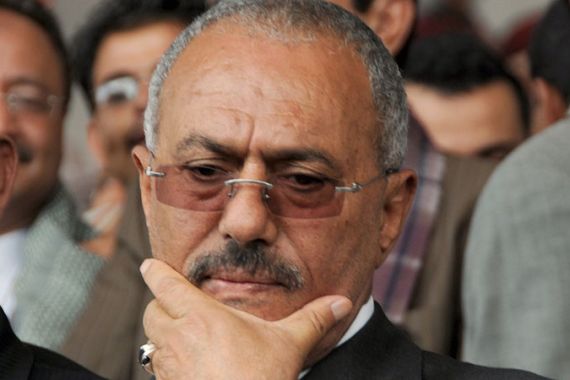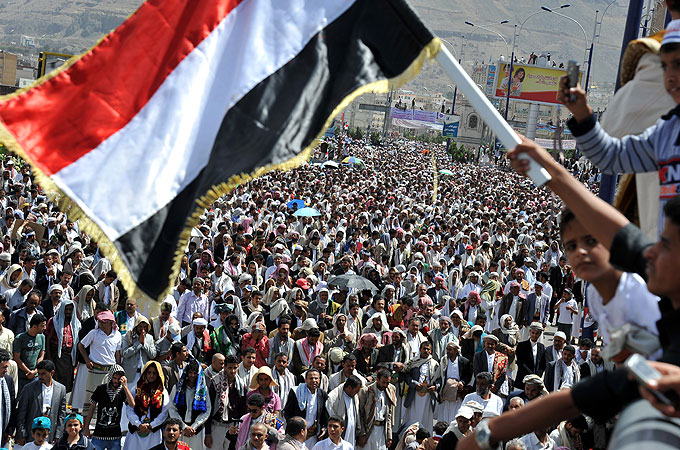Reports: Saleh refuses to sign exit deal
Yemeni president backs away from signing agreement requiring him to give up power in exchange for legal immunity.

 |
| Many anti-government protesters have rejected Saleh’s deal and have called for him to be held accountable [EPA] |
The Yemeni president has refused to sign a Gulf Arab-led agreement to give up power in exchange for legal immunity, sources say.
Saturday’s development was a new blow to efforts to mediate the months-old crisis between Ali Abdullah Saleh and demonstrators inspired by protests sweeping through the Arab region to demand his overthrow.
Abdul-Latif al-Zayyani, secretary-general of the Gulf Co-operation Council (GCC), which brokered the agreement, had flown to the Yemeni capital, Sanaa, on Saturday to urge Saleh to sign the deal.
Instead, he met high-level leaders of Saleh’s governing political party and parliamentary bloc, where he was informed that Saleh had some reservations over the deal.
Al-Zayyani was not immediately available for comment.
While Yemen’s opposition political parties have accepted the deal, many anti-government protesters have rejected it because of the fact that it will keep Saleh – in power for 32 years – from being tried.
They called for him to be put on trial for corruption and the deaths of an estimated 142 protesters since the opposition rallies began three months ago.
Fresh fatalities
Saturday’s developments came amid reports of more deaths of anti-government protesters. Two soldiers and four civilians were killed and at least another 23 were wounded during a shutdown in southern Yemen, officials said.
The protesters in Aden were demanding Saleh’s immediate overthrow and prosecution.
The defence ministry said an officer and a soldier were killed and two more soldiers were wounded, but gave no further details as tension mounted in the restive region.
|
|
Local officials said protesters opened fire on troops as they tried to dismantle roadblocks set up near Al-Mansura neighbourhood in Aden to demonstrate against Saleh’s government.
They said troops moved into the area from where they suspected the attack was launched and opened fire, killing at least three civilians and wounding at least another 15 more.
The casualties were taken to a hospital, a medical source said.
Another body was at a private hospital, raising the number of civilians killed in the area on Saturday to four, the sources said.
Tensions in Yemen have surged since assailants shot dead 12 protesters in Sanaa on Wednesday and the opposition warned that violence could derail the deal.
Tens of thousands of protests took to the streets across Yemen on Friday, vowing to stay there until Saleh quits his post, which he held since 1978.
“The people want the trial of the murderer,” some anti-government demonstrators shouted.
Transitional government
The GCC deal stipulates that Saleh step down in a month and offers him and his entourage, including relatives who run branches of the security forces, immunity from prosecution.
Analysts say the 30-day window for Saleh to resign gives plenty of time for disgruntled forces from the old guard to stir trouble in Yemen, where half of the population owns a gun and al-Qaeda has gained a foothold in its mountainous regions.
The US and Saudi Arabia want the Yemen standoff resolved to avert chaos that could enable al-Qaeda to operate more freely.
Should the deal go through, Saleh would appoint a prime minister from the opposition to head a transition government, which would set up presidential elections 60 days after he resigns.
Saleh has in principle accepted the agreement negotiated by the six-state member GCC.
His departure would make Saleh the third ruler, after Tunisia and Egypt, to be ousted by a wave of popular uprisings.